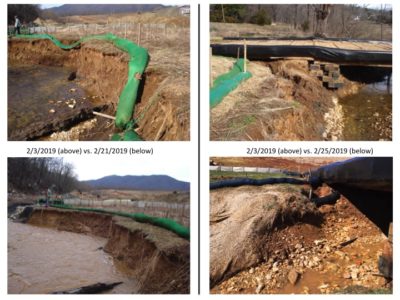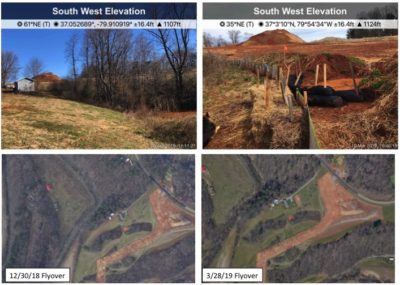
An erosion-control fence along the Mountain Valley Pipeline route at the Garst site in Franklin County fais to prevent muddy runoff from construction.
It can often seem as if government and business are on the same side.
In the case of the Mountain Valley Pipeline, the agencies that exist to safeguard the health of citizens and the environment have decided to take a back seat, remaining quiet while industry, at the wheel, plays loose with the law.
In the absence of government help, organizations like Mountain Valley Watch take up the regulatory slack. Their trained volunteers carefully track construction on the MVP. As of an April 2019 report, the Watch’s monitors have found 562 problems.
Inadequate erosion control is a persistent occurrence along the pipeline’s path.
At the Garst site, in Franklin County, mud is seen flowing past erosion control barriers. One image, from January, shows mud exceeding the height of fencing and coming down a hillside. A stream and wetland are below.

Stream erosion causes a streambank to shear off along Teels Creek along the Mountain Valley Pipeline route in Franklin County, Va.
Elsewhere, near the Angle family’s property, an unsecured mound of reddish soil, itself surrounded by barren soil, looms.
Construction of the MVP slowed down over the winter, but this land was still left exposed to the elements. It was ripe for erosion, and streamed into the Angles’ pond.
Erosion control pellets dropped on the site by MVP workers had no discernible effect. In fact, the helicopters used to drop them have served as an irritant. According to the April report’s authors, low-flying helicopters “[create] an atmosphere of constant surveillance and intimidation” for people impacted by the pipeline.
The Mountain Valley Watch describes this method of aerial seeding as “imprecise.” Wind carried off most of the pellets released near the Angles, and in West Virginia pellets found their way onto an organic farm, endangering their organic certification.

An unsecured mound of dirt surrounded by barren soil from construction looms along the route of the Mountain Valley in Franklin County, Va.
In addition, barren project sites were not stabilized within the timeline laid out by the state. “Temporary soil stabilization,” write the report’s authors, citing state rules, “shall be applied within seven days to denuded areas” that “will remain dormant for longer than 14 days.”
Virginia Attorney General Mark Herring sued the MVP in late 2018, in light of the pipeline’s history of violations, many of which were first observed, documented and reported by the citizen scientists of Mountain Valley Watch.
Since then, the Virginia Department of Environmental Quality has claimed that the MVP has rectified its problems.
The court may still hit the MVP with a civil penalty, with the money going to the state. However, the state is not required to use this money to help those affected by the pipeline’s violations.
There is little suggestion that MVP has learned from its mistakes. Mountain Valley Watch volunteers continue to document environmental degradation along the pipeline’s route with its data tool, the Dashboard.
Nothing short of a work stoppage will provide relief to those who live in the MVP’s path.



Leave a Reply